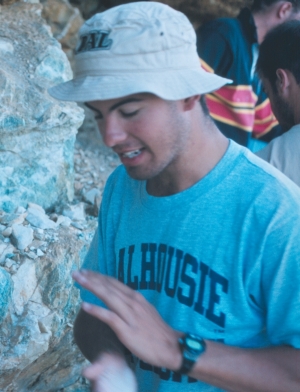Mark Berry

The MacEachern - Ponsford Memorial Award - 2001
B.Sc. (Honours) Thesis
Deep-Sea Coral: Their Use As Climate Change Indicators
(PDF - 2.8 Mb)
The need for accurate climate change models is a major issue with the increasing concern of global warming. Recently deep-sea corals have been calibrated for seawater temperatures using isotopic ratios since they record the surrounding seawater temperatures through element partitioning. The coral species, Flabellum alabastrum, found along the Atlantic coast on the continental slope, can be analyzed with an electron microprobe for Sr and Ca levels to calibrate bottom temperatures. This study compares seven corals off the coast of Nova Scotia along the Scotian Slope where temperatures over the past 50 years are known. Currents along the slope where deep-sea corals are found control the temperature variations recorded in Flabellum alabastrum. Cooler currents from the north lower water temperatures, while warmer currents from the south raise the water temperature. A temperature calibration curve has been created through the correlation of known temperature changes with variations in the Sr/Ca ratio. This curve can than be used to determine water temperatures that other Flabellum corals lived in using their Sr/Ca ratios. Although Flabellum provide a means of monitoring water temperature changes, extraction of this information may prove to be difficult because of the size and growth patterns they possess.
Keywords:
Pages: 53
Supervisor: David Scott



